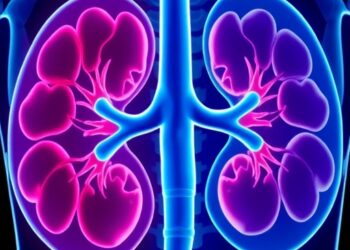Transgender women are still at risk for prostate cancer. A new study led by Cedars-Sinai Cancer investigators, published in the peer-reviewed Journal of the American Medical Association, concludes that current screening guidelines could miss early-stage prostate cancer in transgender women on hormone therapy.
Transgender women are still at risk for prostate cancer. A new study led by Cedars-Sinai Cancer investigators, published in the peer-reviewed Journal of the American Medical Association, concludes that current screening guidelines could miss early-stage prostate cancer in transgender women on hormone therapy.
The prostate, a small gland that helps make semen, also produces a protein called prostate-specific antigen, or PSA. Blood levels of PSA tend to be elevated in people who have prostate cancer, and the PSA test, which measures those levels, is a common prostate cancer screening tool.
“Many transgender women take estrogen as part of their gender-affirming care,” said Stephen Freedland, MD, the Warschaw, Robertson, Law Families Chair in Prostate Cancer at Cedars-Sinai and senior author of the study. “This drastically lowers PSA levels, which could mean the threshold we are using as ‘normal’ is too high to detect early-stage cancer in these patients. We undertook this study to determine typical PSA values for this population so that we can screen them more appropriately.”
According to current guidelines, PSA levels above 4.0 nanograms per milliliter of blood (ng/mL) suggest cancer could be present, and that additional investigation, such as a prostate biopsy, is needed.
“In the study, we used Veterans Health Administration records to identify 210 transgender women without known prostate cancer who were taking estrogen,” said Farnoosh Nik-Ahd, MD, a urology resident at the University of California, San Francisco, and first author of the study. “We found that the median PSA value, the midpoint in the range of participants, was 0.02 ng/mL, which is fiftyfold lower than PSA values reported in similar-aged cisgender men.”
This suggests that if they are taking estrogen, transgender women who develop prostate cancer wouldn’t see their PSA rise to levels that trigger additional screening until their cancer was at a later stage, making it more difficult to treat. Nik-Ahd said that patients and clinicians should be aware of this and interpret results with caution.
“Cedars-Sinai Cancer serves one of the most diverse patient populations in the country,” said Dan Theodorescu, MD, PhD, director of Cedars-Sinai Cancer and the PHASE ONE Foundation Distinguished Chair. “This work is part of our mission to conduct research that helps us understand the unique needs of our patients, then translate our findings into practices that improve patient outcomes.”
Additional research is needed to pinpoint a specific PSA level that indicates a transgender woman taking estrogen is at high risk for developing prostate cancer. And Freedland, who is also a professor of Urology at Cedars-Sinai and staff physician at the Durham VA Medical Center in North Carolina, said this study is not a call for transgender women to be screened.
“We know that PSA screening reduces the risk that cisgender men ages 55 to 69 will die of prostate cancer, but we don’t know that it does the same thing for transgender women taking estrogen,” Freedland said. “However, because some of these women are being screened, we want to raise awareness that their typical PSA levels are different.”
Along with increased awareness, Freedland hopes to eventually see updated PSA screening guidelines. In the meantime, he advises transgender women who are taking estrogen to consult with their healthcare providers.
“Don’t forget that you have a prostate and that prostates can become cancerous,” Freedland said. “The best way we know to find those cancers early and reduce the risk of death is a PSA test. And if you choose to do that, keep in mind that the test values are not calibrated for you. Bring your results—and possibly this study—to your urologist so that your results will be interpreted by someone who understands what to do with that information.”
Funding: Research reported in this publication was supported by NIA grant number R38AG07017, the 2023 Urology Care Foundation Residency Research Award Program, and the Robert J. Krane, MD, Urology Research Fund.
Additional authors include: Amanda M. De Hoedt, MS; Christi Butler, MD; Jennifer T. Anger, MD; Peter R. Carroll, MD, MPH; and Matthew R. Cooperberg, MD, MPH.
Journal
JAMA
Method of Research
Meta-analysis
Subject of Research
People
Article Title
Prostate-Specific Antigen Values in Transgender Women on Estrogen
Article Publication Date
26-Jun-2024




